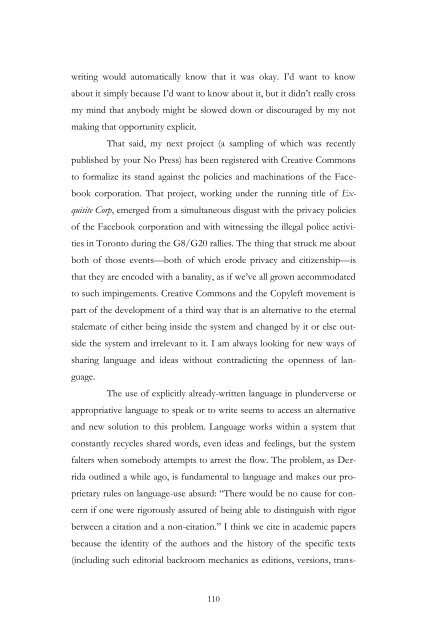CONTACT WITH POETS
Ev4Qw3
Ev4Qw3
Create successful ePaper yourself
Turn your PDF publications into a flip-book with our unique Google optimized e-Paper software.
writing would automatically know that it was okay. I’d want to know<br />
about it simply because I’d want to know about it, but it didn’t really cross<br />
my mind that anybody might be slowed down or discouraged by my not<br />
making that opportunity explicit.<br />
That said, my next project (a sampling of which was recently<br />
published by your No Press) has been registered with Creative Commons<br />
to formalize its stand against the policies and machinations of the Facebook<br />
corporation. That project, working under the running title of Exquisite<br />
Corp, emerged from a simultaneous disgust with the privacy policies<br />
of the Facebook corporation and with witnessing the illegal police activities<br />
in Toronto during the G8/G20 rallies. The thing that struck me about<br />
both of those events—both of which erode privacy and citizenship—is<br />
that they are encoded with a banality, as if we’ve all grown accommodated<br />
to such impingements. Creative Commons and the Copyleft movement is<br />
part of the development of a third way that is an alternative to the eternal<br />
stalemate of either being inside the system and changed by it or else outside<br />
the system and irrelevant to it. I am always looking for new ways of<br />
sharing language and ideas without contradicting the openness of language.<br />
The use of explicitly already-written language in plunderverse or<br />
appropriative language to speak or to write seems to access an alternative<br />
and new solution to this problem. Language works within a system that<br />
constantly recycles shared words, even ideas and feelings, but the system<br />
falters when somebody attempts to arrest the flow. The problem, as Derrida<br />
outlined a while ago, is fundamental to language and makes our proprietary<br />
rules on language-use absurd: “There would be no cause for concern<br />
if one were rigorously assured of being able to distinguish with rigor<br />
between a citation and a non-citation.” I think we cite in academic papers<br />
because the identity of the authors and the history of the specific texts<br />
(including such editorial backroom mechanics as editions, versions, trans-<br />
110


